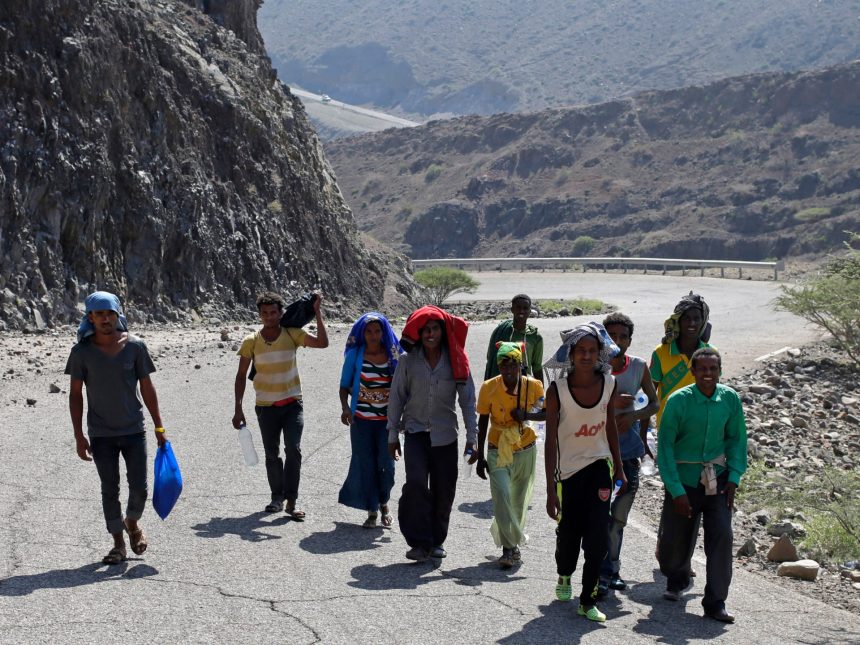Ethiopia will launch a joint investigation with Saudi Arabia into a Human Rights Watch (HRW) report accusing the kingdom’s border guards of killing hundreds of Ethiopian migrants, the Ministry of Foreign Affairs says.
“The Government of Ethiopia will promptly investigate the incident in tandem with the Saudi Authorities,” the ministry said on X, formerly Twitter, on Tuesday, a day after the publication of the HRW report sparked global outrage.
“At this critical juncture, it is highly advised to exercise utmost restraint from making unnecessary speculations until [the] investigation is complete,” the ministry said, noting the “excellent longstanding relations” between Addis Ababa and Riyadh.
The allegations, described as “unfounded” by a Saudi government source, point to a surge in abuses along the perilous route from the Horn of Africa to Saudi Arabia, where hundreds of thousands of Ethiopians live and work.
Women and children were among those killed while attempting to enter the kingdom along its mountainous border with Yemen.
One 20-year-old woman from Ethiopia’s Oromia region, interviewed by HRW, said Saudi border guards opened fire on a group of migrants they had just released from custody.
“They fired on us like rain. When I remember, I cry,” she said.
In a 73-page report, the rights group said Saudi guards used explosive weapons to kill some migrants and shot at others from close range. It compiled testimony from 38 Ethiopians who tried to cross the Yemen-Saudi border between March 2022 and June 2023, as well as four relatives or friends of migrants.
Human Rights Watch said attacks against groups of migrants, who used remote mountain tracks to cross into Saudi Arabia by foot, were “widespread and systematic” and that the “killings are continuing”.
‘Very concerning’
HRW said it based its report on witness testimony as well as 350 videos and photos of wounded and killed migrants, and satellite imagery showing the location of Saudi Arabian guard posts. The advocacy group however said its researchers were unable to access the stretch of the Yemen-Saudi border where the alleged killings took place.
Washington, a longtime ally of Riyadh, urged “a thorough and transparent investigation” into the allegations, which were dismissed by a Saudi government source who spoke to the AFP news agency.
“The allegations … about Saudi border guards shooting Ethiopians while they were crossing the Saudi-Yemeni border are unfounded and not based on reliable sources,” said the source, who requested anonymity.
The European Union noted with “concern” the HRW allegations and plans to raise them with Riyadh and with the Houthi rebels who control strategic parts of Yemen, a spokesperson, Peter Stano, said on Tuesday.
“We welcome the announcement by the government of Ethiopia, specifically, to investigate the whole issue together with the authorities in Saudi Arabia,” he said.
United Nations spokesperson Stephane Dujarric called the report “very concerning”, but noted the “serious” allegations were difficult to verify.
‘Widespread and systematic’
New York-based HRW has documented abuses against Ethiopian migrants in Saudi Arabia and Yemen for nearly a decade.
But it said the latest killings appear to be “widespread and systematic” and may amount to crimes against humanity.
Last year, UN experts reported “concerning allegations” that “cross-border artillery shelling and small-arms fire by Saudi Arabia security forces killed approximately 430 migrants” in southern Saudi Arabia and northern Yemen during the first four months of 2022.
In March of that year, the repatriation of thousands of Ethiopians from Saudi Arabia began under an agreement between the two countries.
There are an estimated 750,000 Ethiopians in Saudi Arabia, according to the UN. Many have fled economic hardship in Ethiopia, which has also seen its northern province of Tigray riven by a brutal conflict in recent years.
The migration route from the Horn of Africa, across the Gulf of Aden, through Yemen, and into Saudi Arabia – one of the richest countries in the Arab world – is a well-established corridor for Ethiopian migrants.











